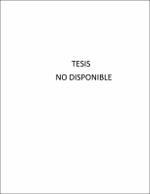Mostrar el registro sencillo del ítem
Maternidad subrogada: ¿una realidad en el Perú?
| dc.contributor.advisor | Salazar Lizarraga, Mariano | |
| dc.contributor.author | Canelo Garrido, Katherine Lizet | |
| dc.creator | Canelo Garrido, Katherine Lizet | |
| dc.date.accessioned | 2017-10-11T13:57:58Z | |
| dc.date.available | 2017-10-11T13:57:58Z | |
| dc.date.issued | 2017 | |
| dc.identifier.uri | https://hdl.handle.net/20.500.12759/3105 | |
| dc.description.abstract | En el presente trabajo de investigación, nos hemos abocado al estudio de la técnica de reproducción humana asistida de la maternidad subrogada y el uso de la misma en la sociedad peruana actual. En este sentido, la formulación de nuestro problema fue: ¿Frente al vacío legal sobre la práctica de la maternidad subrogada, existe la necesidad de normativizar sobre esta técnica de reproducción asistida en el Perú? Este trabajo tuvo como motivación, el hecho de una deficiente legislación sobre técnicas de reproducción humana asistida, que regulen entre ellas la técnica de la maternidad subrogada como un método reproductivo legítimo, a la luz de los adelantos logrados por la ciencia médica sobre dicha materia. Frente a esta problemática se planteó la siguiente hipótesis de investigación: “Existe la necesidad de normativizar sobre la maternidad subrogada debido a la práctica de esta técnica en nuestra sociedad y reconocida jurisprudencialmente en el Perú”. En cuya virtud propusimos las siguientes metas y objetivos: Identificar las razones jurídicas que sustenten la necesidad de normativizar sobre la maternidad subrogada en el Perú; explicar los vacíos legales frente a la práctica de esta técnica, así como proponer la regulación sobre la maternidad subrogada parcial y altruista en el Perú. Finalmente, se concluye que debe normativizarse respecto a la práctica de la maternidad subrogada en nuestro país, la cual debe estar orientada a permitir su realización, en la medida que reúna las características de parcialidad y altruista, pues de esta forma se logra el equilibrio entre el ejercicio de los derechos de los intervinientes, los padres y la gestante, y los del recién nacido; en ese sentido, deberá tenerse en cuenta que la formulación de una norma en sentido contrario conllevaría al desarrollo de mayores conflictos y representaría la negación del ejercicio de los derechos fundamentales. | es_PE |
| dc.description.abstract | In the present research, we have focused on the technique of assisted human reproduction of surrogate motherhood and the use of it in current Peruvian society. In this sense, the formulation of our problem was: Given the legal vacuum on the practice of surrogate motherhood, is there a need to standardize on this technique of assisted reproduction in Peru? This work was motivated by a deficient legislation on techniques of assisted human reproduction, which regulate the technique of surrogate motherhood as a legitimate reproductive method, in the light of the advances made by medical science in this field. Faced with this problem the following research hypothesis was raised: ““There is a need to standardize on surrogacy due to the practice of this technique in our society and recognized jurisprudential in Peru.““ By virtue of which we proposed the following goals and objectives: Identify the legal reasons that support the need to regulate surrogate motherhood in Peru; To explain the legal gaps in the practice of this technique, as well as to propose the regulation on surrogate partial and altruistic maternity in Peru. Finally, it is concluded that it should be normalized with respect to the practice of surrogacy in our country, which should be oriented to allow its realization, insofar as it meets the characteristics of partiality and altruistic, because in this way the balance between The exercise of the rights of the participants, the parents and the pregnant woman, and those of the newborn; In this regard, it should be borne in mind that the formulation of a rule to the contrary would lead to the development of greater conflicts and would represent a denial of the exercise of fundamental rights. | en_US |
| dc.description.uri | Tesis | es_PE |
| dc.format | application/pdf | es_PE |
| dc.language.iso | spa | es_PE |
| dc.publisher | Universidad Privada Antenor Orrego - UPAO | es_PE |
| dc.relation.ispartofseries | T_DERE_362 | |
| dc.rights | info:eu-repo/semantics/closedAccess | es_PE |
| dc.source | Universidad Privada Antenor Orrego | es_PE |
| dc.source | Repositorio Institucional - UPAO | es_PE |
| dc.subject | Subrogada | es_PE |
| dc.subject | Maternidad | es_PE |
| dc.title | Maternidad subrogada: ¿una realidad en el Perú? | es_PE |
| dc.type | info:eu-repo/semantics/bachelorThesis | es_PE |
| thesis.degree.level | Título Profesional | es_PE |
| thesis.degree.grantor | Universidad Privada Antenor Orrego. Facultad de Derecho y Ciencias Políticas | es_PE |
| thesis.degree.name | Abogado | es_PE |
| thesis.degree.discipline | Derecho | es_PE |
Ficheros en el ítem
Este ítem aparece en la(s) siguiente(s) colección(es)
-
Derecho [428]

